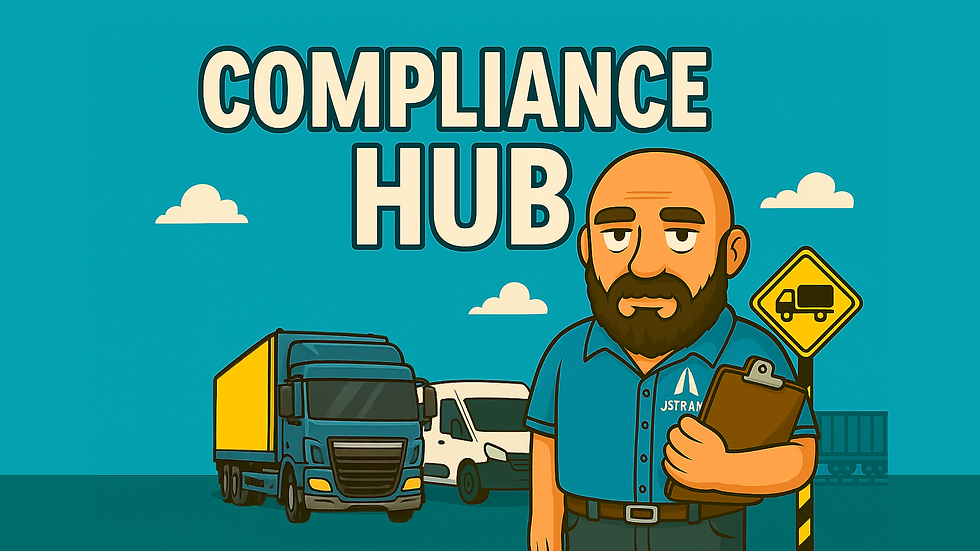What Is a Public Inquiry? A Guide for Restricted Licence Operators
- stuart47304
- Jul 8, 2025
- 4 min read

You’ve received a letter from the Office of the Traffic Commissioner. It says:
“You are required to attend a Public Inquiry concerning your Operator’s Licence…”
If you’re like most Restricted Operators, your heart sinks. You weren’t expecting this. You’re not a haulier. You only run a couple of trucks. What could you possibly have done wrong?
This guide explains:
What a Public Inquiry is
Why you might be called to one
What happens at the hearing
What powers the Traffic Commissioner has
How to prepare
How to protect your licence and business
What Is a Public Inquiry?
A Public Inquiry (PI) is a formal legal hearing held by the Traffic Commissioner to examine potential breaches of Operator Licence undertakings, road safety rules, or repute.
It’s not a criminal court — but it can have serious consequences, including:
Curtailment (reducing the number of vehicles you can operate)
Suspension of your licence
Revocation of your licence
Disqualification from operating vehicles in the future
It is a public, formal, recorded process — and should never be taken lightly.
Why Might a Restricted Licence Holder Be Called to a PI?
Although Public Inquiries are more commonly associated with large operators, Restricted Licence holders are regularly called in for:
Reason | Examples |
Maintenance failings | Missed inspections, dangerous defects, prohibitions |
Tachograph issues | Misuse, lack of data, no training or downloads |
Record-keeping failures | No paperwork, missing reports, poor administration |
Operating centre breaches | Unauthorised parking, complaints from residents |
Financial standing | Failing to prove funds, running at a loss |
Ignorance of undertakings | “I didn’t know” is not a valid defence |
Ignoring DVSA correspondence | Failure to engage is a red flag |
Serious road safety issues | Repeated faults, traffic offences, collisions |
What Triggers a Public Inquiry?
You may receive a call to PI if:
You’ve had one or more prohibitions at roadside
A DVSA desk-based assessment or site visit found serious gaps
You’ve failed to respond to enforcement action
There’s been a complaint about your Operating Centre
You’ve submitted an application that raises concerns (e.g. change of entity, increased vehicle numbers)
Sometimes you’ll be given a chance to explain in writing before a PI is arranged. Take this opportunity seriously.
What Happens During a Public Inquiry?
You’ll receive a formal letter
This includes the date, location (or virtual meeting link), and reasons for the PI
It may be accompanied by a DVSA report or case file
You must confirm attendance
If you don’t attend, the PI may proceed in your absence
You can appoint a representative
A transport consultant or solicitor can attend with you
The hearing begins
The Traffic Commissioner reviews the facts, asks questions, and listens to your evidence
It’s formal — but you can speak freely
You’ll be asked to explain
Why the failures occurred
What steps you’ve taken since
How you plan to stay compliant
The Commissioner makes a decision
This may be given on the day, or in writing later
What Powers Does the Traffic Commissioner Have?
At a Public Inquiry, the TC can:
✅ Take no action (if satisfied)
🔁 Issue a formal warning
✂️ Curtail your licence (reduce vehicles allowed)
⏸️ Suspend your licence temporarily
❌ Revoke your licence entirely
🚫 Disqualify you from holding another licence
👥 Call connected persons or companies to account
The decision is based on evidence, honesty, and your ability to change.
How to Prepare for a Public Inquiry
If you’ve been called to PI, preparation is crucial.
✅ 1. Understand the Allegations
Read the DVSA report thoroughly
List every issue raised (e.g. PMI gaps, defect handling, tachograph data)
Be ready to explain what went wrong and why
✅ 2. Gather Supporting Evidence
Maintenance records
Safety inspection reports
Defect books and repair sheets
Tachograph reports or logs
Licence check records
Training documents or policies
✅ 3. Show Remedial Action
Have you changed providers?
Implemented a planner or checklist?
Started training or downloaded tacho data?
Hired a consultant or External Transport Manager?
The TC doesn’t expect perfection — but they do expect action.
✅ 4. Be Honest and Professional
Don’t blame others
Don’t guess answers
Be clear, factual, and show you understand your responsibilities
Own your mistakes — and show how you’ll fix them
What Makes a Good Impression at PI
Positive Sign | Why It Matters |
Well-organised documents | Shows control and care |
Written policies or logs | Demonstrates proactive compliance |
Timely responses to DVSA | Indicates cooperation |
Evidence of improvement | Supports repute and reliability |
Use of professional support | Shows you’re taking things seriously |
Common Mistakes at PI
Mistake | Consequence |
Saying “I didn’t know” | Not accepted as a defence |
Turning up with no documents | Seen as disorganisation |
Blaming staff | You are still legally responsible |
Hiding problems | DVSA often already knows |
Not turning up | Licence likely to be revoked in absence |
Can You Appeal a Public Inquiry Decision?
Yes — you can appeal to the Upper Tribunal if you believe the decision was:
Legally flawed
Unfairly made
Based on incorrect information
But appeals can be time-consuming and costly. It’s best to prepare properly the first time around.
Conclusion
A Public Inquiry is not the end — but it can be if you ignore it.
If you receive a call to PI, treat it as a wake-up call. The Traffic Commissioner wants to know whether you can be trusted to hold a licence going forward.
With preparation, honesty, and a willingness to improve, many operators emerge stronger — with their licence intact and systems upgraded.
Next in the series:👉 How to Prepare for a Public Inquiry and What to Expect
